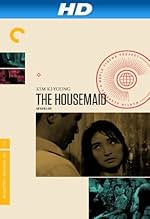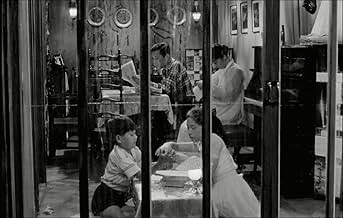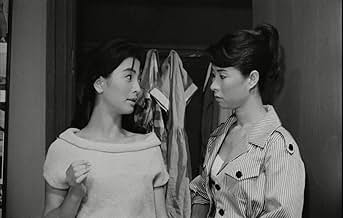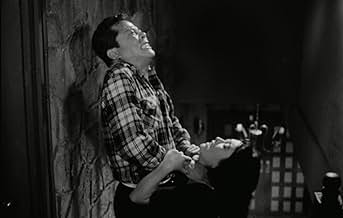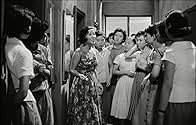NOTE IMDb
7,2/10
6,3 k
MA NOTE
Un compositeur et sa femme sont emportés dans la tourmente lorsqu'une servante affiche un comportement inattendu.Un compositeur et sa femme sont emportés dans la tourmente lorsqu'une servante affiche un comportement inattendu.Un compositeur et sa femme sont emportés dans la tourmente lorsqu'une servante affiche un comportement inattendu.
Kim Jin-kyu
- Dong-sik Kim
- (as Jin Kyu Kim)
Ahn Sung-ki
- Chang-soon Kim
- (as Sung-kee Ahn)
Avis à la une
Ki-young Kim's "The Housemaid" proved an interesting viewing experience for me, in that it ultimately differed very much from what I had come to expect about a half hour into the film. What we appear to have here is another film like Joseph Losey's "The Servant", which was a left-wing, revolutionary exercise in which a lower class man enters an upper class household as a servant, and ultimately takes over the bourgeois home, throwing it into upheaval and chaos. Likewise, in "The Housemaid", a young woman joins a wealthier household as a maid, and instantly things begin to take a turn toward disorder and familial disintegration. It could easily be a revolutionary, communist film like Losey's. It is not.
In fact, it is the polar opposite. It turns out that "The Housemaid" is actually an overtly conservative film. This film is undebatably a defense of traditional family values like faithfulness, fidelity, and monogamy. Another film with a virtually identical plot could have just as easily been an attack on those same values. In "The Housemaid", however, the character of the maid is not the instrument of revolution, the hand of Marxist justice that has come to wipe out every trace of bourgeois society from our microcosmic household (e.g. Dirk Bogarde's character in "The Servant"); rather, she is the face of temptation, the tantalizer that will be the destruction of a healthy, happy family, should the patriarchal figure fall into that inescapable abyss of adultery.
Some viewers have interpreted the film in other ways, though I don't see how they could. This isn't that kind of film. There really isn't anything ambiguous here. The only exception — the one place where interpretation of the film's message might become a bit convoluted — is the framing device that Kim uses at the film's bookends. I would note the likelihood that this was added for the sake of the censors. After all, it is somewhat surprising that Kim got this film passed in the first place, and the frame story, which abruptly obliterates the reality of the film's central storyline, may have been the only reason he was able to do so. Despite my usual partiality for any kind of narrative complexity or nonlinear structure, I felt this device was mildly detrimental to the film's integrity. Regardless, it really doesn't change anything about the nature of the film's message.
Thematically, the key moment in the film comes fairly early on, immediately after the decisive act of infidelity. Kim goes to great lengths to underline this instant as the pivotal moment in the lives of his characters, a moment from which there will be no return. He achieves this rather heavy-handedly, by cutting away from the room in which the action occurs, to a shot of a large tree standing outside the house, which is immediately struck by lightning, as if to make it abundantly clear, written in Fuller-esque boldface type: This is the moment that changes everything! This is the undoing of a family!
It's not a subtle film, needless to say. There are, however, master touches throughout. The cinematography is certainly impressive, as is Kim's direction. The laterally panning shots through the plate glass on the upper floor of the house are fantastic. It is quite a well shot film, and Kim works inspiringly within the limited space of only a few settings.
Dramatically, however, "The Housemaid" was somewhat disappointing. The film can't decide whether it wants to be a Buñuelian art film or a Hitchcockian thriller, and the resulting blend is very uneven, increasingly as the film progresses. Kim never gives this film any real, constant identity. The score was quite poor. With its obtrusive and highly transparent attempts at creating tension and coercing the viewer into a certain emotion, it never ceased to intrude on the viewing experience.
This may be a political film — it certainly has a plainly conservative message — but if it is, it's not because Kim intended it to be. Despite being pressured by his government to foray into political filmmaking on a few occasions, Kim himself was not particularly interested in politics. He once said, "North or south, capitalist or communist, ideology is far less interesting to me than the things that divide the sexes."
Indeed, this is evident in "The Housemaid". Kim is clearly much more interested in the boundaries and barriers between men and women — the impediments that obstruct the path to intimacy and healthy relationships — than he is in any specific political ideology. And this is where the film regains some of its composure. Comparisons have been made to the work of Luis Buñuel and Shôhei Imamura. I can see it, in terms of its portrayal of passion and conflicted attempts at intimacy between the sexes, but on the whole I think those are pretty loose comparisons. "The Housemaid" works best as a psychological drama. When we analyze the motives of the characters, and what drives each of them toward their respective actions, the film comes into focus fairly nicely. When it tries to move into suspense, however, it looses its momentum as a drama, and as a successful, cohesive work of cinema.
All things considered, I think this is a good film. I can't call it a masterpiece, or even a great film, although I know many feel that way about it, but I do think it's quality cinema that's worth seeing. My biggest complaint with the film is its extreme lack of subtlety, in multiple facets of the art of filmmaking. Dramatically, "The Housemaid" goes way over the top one too many times, and thematically, the film essentially boils down to a cautionary tale about adultery and infidelity. Nonetheless, it's a film that deserves to be seen, especially with the relatively small place that South Korea occupies in the cinematic landscape.
RATING: 7.33 out of 10
In fact, it is the polar opposite. It turns out that "The Housemaid" is actually an overtly conservative film. This film is undebatably a defense of traditional family values like faithfulness, fidelity, and monogamy. Another film with a virtually identical plot could have just as easily been an attack on those same values. In "The Housemaid", however, the character of the maid is not the instrument of revolution, the hand of Marxist justice that has come to wipe out every trace of bourgeois society from our microcosmic household (e.g. Dirk Bogarde's character in "The Servant"); rather, she is the face of temptation, the tantalizer that will be the destruction of a healthy, happy family, should the patriarchal figure fall into that inescapable abyss of adultery.
Some viewers have interpreted the film in other ways, though I don't see how they could. This isn't that kind of film. There really isn't anything ambiguous here. The only exception — the one place where interpretation of the film's message might become a bit convoluted — is the framing device that Kim uses at the film's bookends. I would note the likelihood that this was added for the sake of the censors. After all, it is somewhat surprising that Kim got this film passed in the first place, and the frame story, which abruptly obliterates the reality of the film's central storyline, may have been the only reason he was able to do so. Despite my usual partiality for any kind of narrative complexity or nonlinear structure, I felt this device was mildly detrimental to the film's integrity. Regardless, it really doesn't change anything about the nature of the film's message.
Thematically, the key moment in the film comes fairly early on, immediately after the decisive act of infidelity. Kim goes to great lengths to underline this instant as the pivotal moment in the lives of his characters, a moment from which there will be no return. He achieves this rather heavy-handedly, by cutting away from the room in which the action occurs, to a shot of a large tree standing outside the house, which is immediately struck by lightning, as if to make it abundantly clear, written in Fuller-esque boldface type: This is the moment that changes everything! This is the undoing of a family!
It's not a subtle film, needless to say. There are, however, master touches throughout. The cinematography is certainly impressive, as is Kim's direction. The laterally panning shots through the plate glass on the upper floor of the house are fantastic. It is quite a well shot film, and Kim works inspiringly within the limited space of only a few settings.
Dramatically, however, "The Housemaid" was somewhat disappointing. The film can't decide whether it wants to be a Buñuelian art film or a Hitchcockian thriller, and the resulting blend is very uneven, increasingly as the film progresses. Kim never gives this film any real, constant identity. The score was quite poor. With its obtrusive and highly transparent attempts at creating tension and coercing the viewer into a certain emotion, it never ceased to intrude on the viewing experience.
This may be a political film — it certainly has a plainly conservative message — but if it is, it's not because Kim intended it to be. Despite being pressured by his government to foray into political filmmaking on a few occasions, Kim himself was not particularly interested in politics. He once said, "North or south, capitalist or communist, ideology is far less interesting to me than the things that divide the sexes."
Indeed, this is evident in "The Housemaid". Kim is clearly much more interested in the boundaries and barriers between men and women — the impediments that obstruct the path to intimacy and healthy relationships — than he is in any specific political ideology. And this is where the film regains some of its composure. Comparisons have been made to the work of Luis Buñuel and Shôhei Imamura. I can see it, in terms of its portrayal of passion and conflicted attempts at intimacy between the sexes, but on the whole I think those are pretty loose comparisons. "The Housemaid" works best as a psychological drama. When we analyze the motives of the characters, and what drives each of them toward their respective actions, the film comes into focus fairly nicely. When it tries to move into suspense, however, it looses its momentum as a drama, and as a successful, cohesive work of cinema.
All things considered, I think this is a good film. I can't call it a masterpiece, or even a great film, although I know many feel that way about it, but I do think it's quality cinema that's worth seeing. My biggest complaint with the film is its extreme lack of subtlety, in multiple facets of the art of filmmaking. Dramatically, "The Housemaid" goes way over the top one too many times, and thematically, the film essentially boils down to a cautionary tale about adultery and infidelity. Nonetheless, it's a film that deserves to be seen, especially with the relatively small place that South Korea occupies in the cinematic landscape.
RATING: 7.33 out of 10
... and this one truly did besides being as intense a psychological study as Joseph Losey's "The Servant". I am generally unscareable and though I appreciate the talent in films like "The Exorcist" which can frighten others, for me it always falls flat as I must have been born repeating the advertising line from "Last House on the Left" stating "Remember...it is only a movie, it is only a movie." So the fact that this was both fascinating as a character study and scary enough to make one bejeeberless was impressive.
I actually jumped in my seat at one point in "The Housemaid" and will never look at packages of rat poison the same or even filled glasses of water or some simple rice in a bowl. This psychological masterpiece can cause heart palpitations and I can't even imagine it could be improved in a remake. I kept thinking that the "housemaid" and her unfathomable facial expressions were reminiscent of the maid to Francisco Rabal in Bunuel's "Viridiana" and it was fun to hear the post film comments saying Ki-Young was sometimes compared to Luis.
All in all, I'm so glad I stayed up and watched it in the middle of the night. Sure I could have watched it at a different time, but there's something right about watching a film like that in total darkness and my only complaint regarded the end, but I won't quibble since I also dig films like "The Woman in the Window".
I actually jumped in my seat at one point in "The Housemaid" and will never look at packages of rat poison the same or even filled glasses of water or some simple rice in a bowl. This psychological masterpiece can cause heart palpitations and I can't even imagine it could be improved in a remake. I kept thinking that the "housemaid" and her unfathomable facial expressions were reminiscent of the maid to Francisco Rabal in Bunuel's "Viridiana" and it was fun to hear the post film comments saying Ki-Young was sometimes compared to Luis.
All in all, I'm so glad I stayed up and watched it in the middle of the night. Sure I could have watched it at a different time, but there's something right about watching a film like that in total darkness and my only complaint regarded the end, but I won't quibble since I also dig films like "The Woman in the Window".
When it ended, i was shook. I couldn't believe how insane this movie is. Insane in a good way. I couldn't believe this is a 1960 movie. Even by today standards, this is insane and mindblowing. During the first 20-30 minutes, i thought i knew where it goes and the same will everyone think. But make no mistake, you don't have a clue where it goes. It's not just cheap twists that made this unpredictable but organically flowing turns of the story. I mean, this is coherent and it doesn't shock you just for the shake of shock, with dumb twists that come out of nowhere. The person who wrote this knew exactly what he was doing. Because this is not just insane but brilliant too.
I can't rate it higher because i was not that excited during the first 40-50 minutes. This movie takes its time. I repeat, you think it is just an ordinary story, like a drama romance film noir of this era, with lovers thinking the same old schemes etc. No, it's not. This is way too original and creative. Of course way better than the mediocre 2010 version. The 2010 HANYO is not good. But this is.
Icing on the cake: The last minute. I couldn't believe my own eyes, i watched it three times, that indicates how much i loved it.
I can't rate it higher because i was not that excited during the first 40-50 minutes. This movie takes its time. I repeat, you think it is just an ordinary story, like a drama romance film noir of this era, with lovers thinking the same old schemes etc. No, it's not. This is way too original and creative. Of course way better than the mediocre 2010 version. The 2010 HANYO is not good. But this is.
Icing on the cake: The last minute. I couldn't believe my own eyes, i watched it three times, that indicates how much i loved it.
"Hanyo" ("The Housemaid") works like a very good piece of classical music: It has a slow beginning that seems to go forever, then it adds some crescendos here and there to makes us alarmed, creating a thrilling suspense and a dramatic situation that leads to a powerful and killer ending. You might applause after all that, both the music and the film because when you see the whole picture you realize what a wonderful and memorable works of art they are.
The housemaid of the title is a dangerous female student who enters in the life of a married piano teacher trying to get love from him, no matter if the teacher's wife and kids will suffer so that they can be together. The teacher is controlled by both housemaid and the wife, and he needs to make a decision fast before things get worse for everyone. Here's a story about the value of family in the middle of betrayals, delusions, obsession, tradition, real love versus psychotic forms of love, and plenty of more keywords you may think.
At times "Fatal Attraction" appeared in my mind since there's a significant similarity between both films, and if the story sounds like cliché it is but you must see how it works and who is working with. We're talking about a Korean film and as some of us know, Asian females in older films didn't have the kind of roles the women had in here, powerful and energetic characters that almost boss around with the only men in the story like he was a puppy dog. And the villain? Oh boy! She was one of the most dramatic and perfectly well written villains of all time. Frightening, desperate to the point of threatening the teacher's kids who gets suspicious of everything she serves to them thinking they might get poisoned, this woman knows how to find a answer to everything in order to ruin people's lives, from false rumors to murder.
Don't be let down by the slowness of the first half hour (the characters introduction), try to stay focused all the time and you'll be totally surprised until the very last minute. This is a great film! 9/10
The housemaid of the title is a dangerous female student who enters in the life of a married piano teacher trying to get love from him, no matter if the teacher's wife and kids will suffer so that they can be together. The teacher is controlled by both housemaid and the wife, and he needs to make a decision fast before things get worse for everyone. Here's a story about the value of family in the middle of betrayals, delusions, obsession, tradition, real love versus psychotic forms of love, and plenty of more keywords you may think.
At times "Fatal Attraction" appeared in my mind since there's a significant similarity between both films, and if the story sounds like cliché it is but you must see how it works and who is working with. We're talking about a Korean film and as some of us know, Asian females in older films didn't have the kind of roles the women had in here, powerful and energetic characters that almost boss around with the only men in the story like he was a puppy dog. And the villain? Oh boy! She was one of the most dramatic and perfectly well written villains of all time. Frightening, desperate to the point of threatening the teacher's kids who gets suspicious of everything she serves to them thinking they might get poisoned, this woman knows how to find a answer to everything in order to ruin people's lives, from false rumors to murder.
Don't be let down by the slowness of the first half hour (the characters introduction), try to stay focused all the time and you'll be totally surprised until the very last minute. This is a great film! 9/10
I bought this film on NTSC-VHS format from an online Korean business called koreapop.com. The copy evidently had been put together from two or three diffrent copies of the film, since some parts of the film looked like they were in better shape than others, and also there were English subtitles in some parts, but not most others. (Note that I bought this film knowing that it would be in Korean, with no subtitles).
This movie features what is probably the first scene in cinematic history where a woman rapes a man- a whole 25 years before Isabella Rosellini raped Kyle McCallahan in "Blue Velvet"! As a Korean movie, it's story challenges traditional Korean propriety. The housemaid character is a castrating hose-beast: Not exactly the kind of Korean woman portrayed in most Korean movies made then or now. Director Kim Kiyoung tends to turn the conventional Korean-movie plotline on its head in this movie, since there is no real "happy-ending", in fact, things just seem to get worse and worse. The only other Korean movie similar to it in this sense, is the recently released "Kilimanjaro" (also an EXCELLENT film). This movie is indeed a Korean-movie classic. It's just too bad that the remaining copies of such classic Korean films are not given the best of care, since many, like this one, are in fairly rough shape. I hope that the Koreans will take more pride in their cinematic history and prepare for better archival storage and restoration of their nation's film legacy.
This movie features what is probably the first scene in cinematic history where a woman rapes a man- a whole 25 years before Isabella Rosellini raped Kyle McCallahan in "Blue Velvet"! As a Korean movie, it's story challenges traditional Korean propriety. The housemaid character is a castrating hose-beast: Not exactly the kind of Korean woman portrayed in most Korean movies made then or now. Director Kim Kiyoung tends to turn the conventional Korean-movie plotline on its head in this movie, since there is no real "happy-ending", in fact, things just seem to get worse and worse. The only other Korean movie similar to it in this sense, is the recently released "Kilimanjaro" (also an EXCELLENT film). This movie is indeed a Korean-movie classic. It's just too bad that the remaining copies of such classic Korean films are not given the best of care, since many, like this one, are in fairly rough shape. I hope that the Koreans will take more pride in their cinematic history and prepare for better archival storage and restoration of their nation's film legacy.
Le saviez-vous
- AnecdotesThis was the first and the last film Eun-shim Lee (Myung-sook) starred in. The public hated immoral Myung-sook so much that no director hired her after this film. [She may not have had a starring role, but she was hired for two films after this movie and also appeared in one movie previously.]
- Gaffes(at around 1h 29 mins) The girl, Ae-soon, gets out of bed surprisingly quickly and effortlessly for a young woman needing crutches.
- Citations
Dong-sik Kim: What does the law state about a man who cheats on his wife?
Lyu: [laughs] Sometimes he can get a lighter sentence than for a traffic violation. Once his wife forgives him, he's acquitted. Just as you wouldn't tell your son you're a murderer of a thief, even between couples some things should be kept secret.
- ConnexionsFeatured in L'ivresse de l'argent (2012)
Meilleurs choix
Connectez-vous pour évaluer et suivre la liste de favoris afin de recevoir des recommandations personnalisées
Détails
- Durée1 heure 49 minutes
- Couleur
- Mixage
- Rapport de forme
- 1.37 : 1
Contribuer à cette page
Suggérer une modification ou ajouter du contenu manquant

Lacune principale
By what name was La servante (1960) officially released in Canada in French?
Répondre
